Cognitive Behavioral Therapy: Theory and Practice Analysis
VerifiedAdded on 2022/08/19
|6
|1309
|18
Report
AI Summary
This report provides an overview of Cognitive Behavioral Therapy (CBT), examining its theoretical foundations and practical applications in addressing psychological disorders. The report begins by discussing the basic principles of CBT, highlighting how it streamlines psychosocial treatments for emotional and behavioral problems. It explores various cognitive behavioral techniques used to address clinical problems and delves into the cognitive theory of Beck and Lewinsohn. The report emphasizes the role of cognitive processes in treatment, particularly in panic disorders, and discusses how changes in information processing affect learning experiences. The conclusion reinforces CBT as a form of psychotherapy studied by researchers and emphasizes that the broader the area of CBT, the more there will be equality in the disorders of training and medication policies. The report references several studies and authors to support its claims and provides insights into the effectiveness of CBT in treating various disorders.
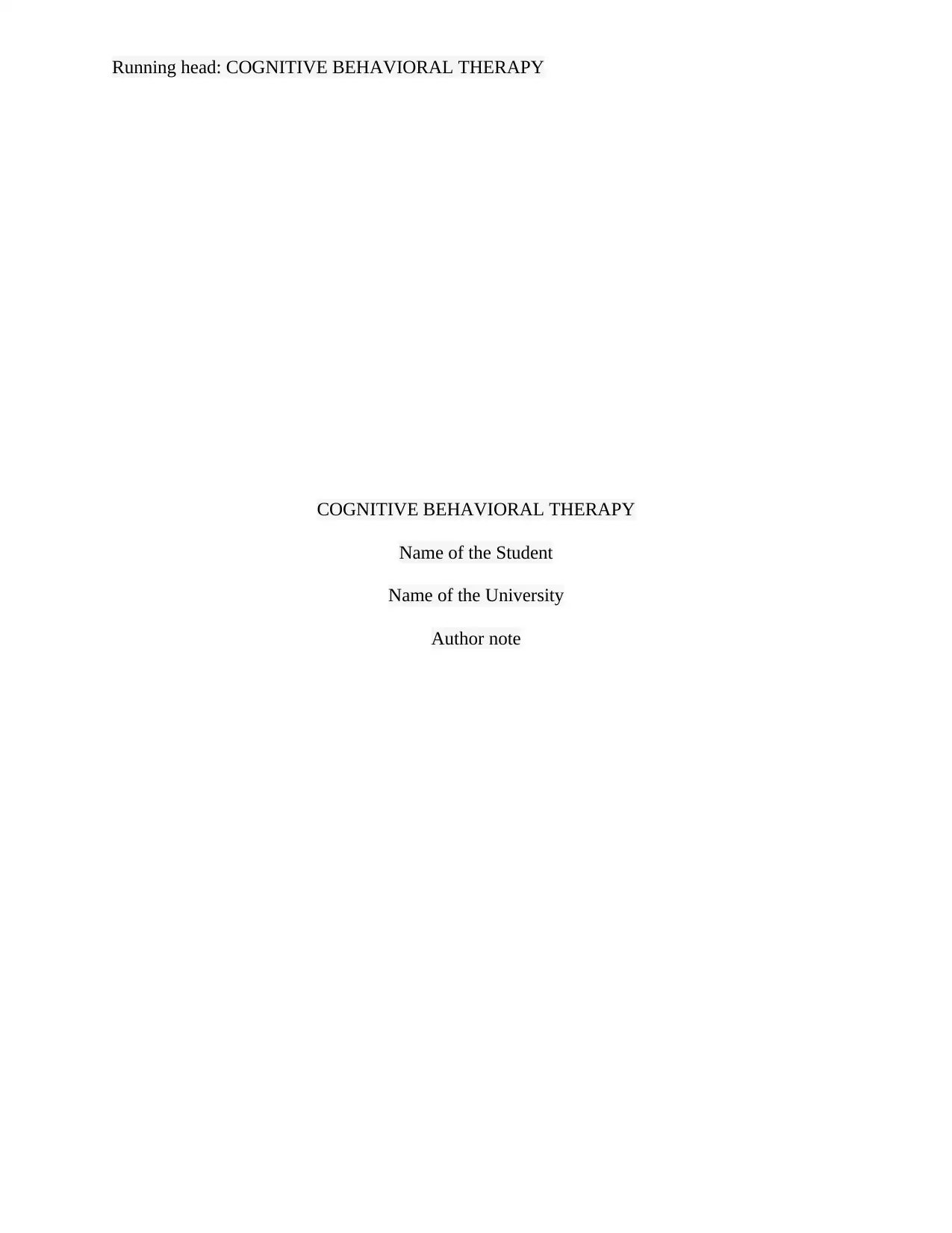
Running head: COGNITIVE BEHAVIORAL THERAPY
COGNITIVE BEHAVIORAL THERAPY
Name of the Student
Name of the University
Author note
COGNITIVE BEHAVIORAL THERAPY
Name of the Student
Name of the University
Author note
Paraphrase This Document
Need a fresh take? Get an instant paraphrase of this document with our AI Paraphraser
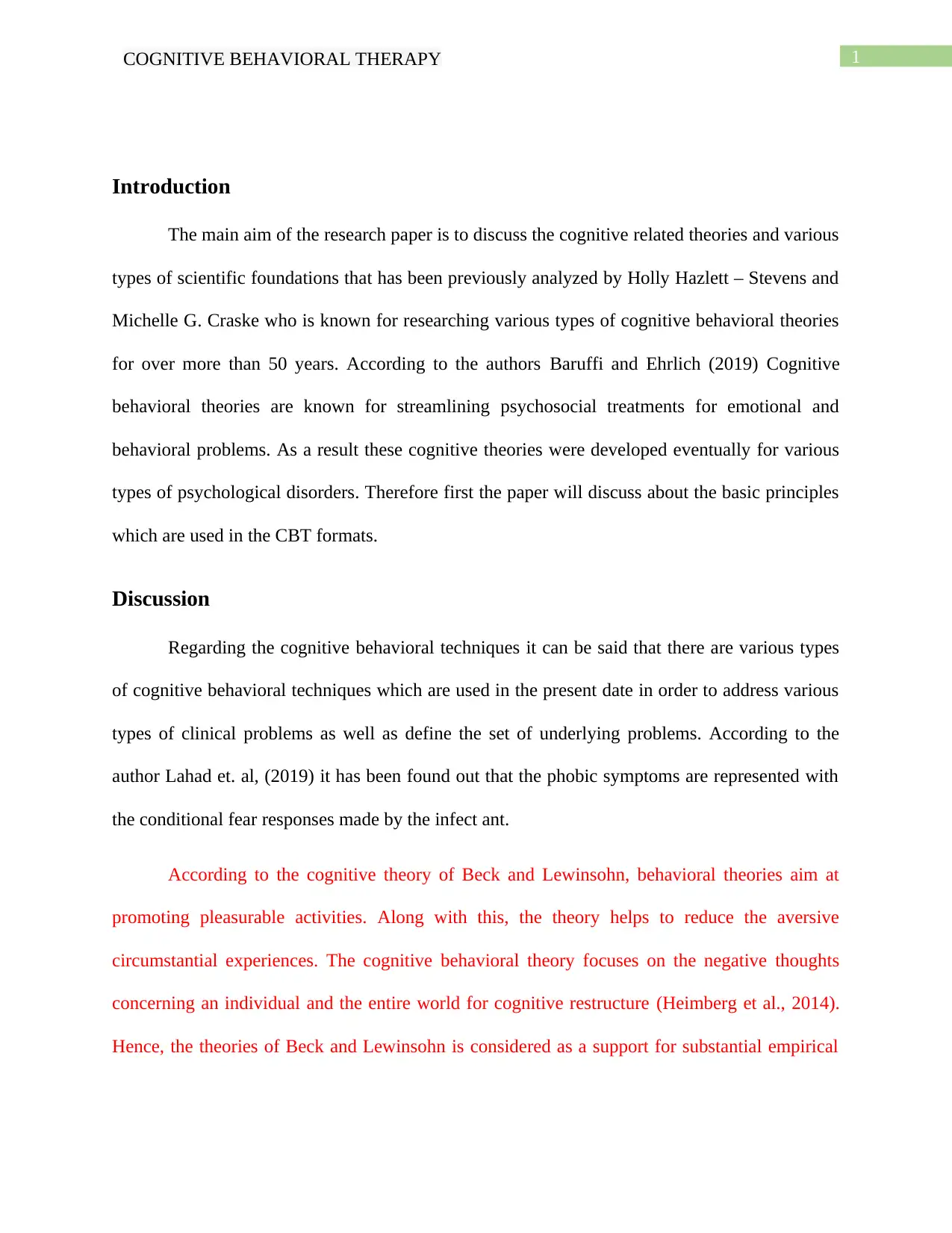
1COGNITIVE BEHAVIORAL THERAPY
Introduction
The main aim of the research paper is to discuss the cognitive related theories and various
types of scientific foundations that has been previously analyzed by Holly Hazlett – Stevens and
Michelle G. Craske who is known for researching various types of cognitive behavioral theories
for over more than 50 years. According to the authors Baruffi and Ehrlich (2019) Cognitive
behavioral theories are known for streamlining psychosocial treatments for emotional and
behavioral problems. As a result these cognitive theories were developed eventually for various
types of psychological disorders. Therefore first the paper will discuss about the basic principles
which are used in the CBT formats.
Discussion
Regarding the cognitive behavioral techniques it can be said that there are various types
of cognitive behavioral techniques which are used in the present date in order to address various
types of clinical problems as well as define the set of underlying problems. According to the
author Lahad et. al, (2019) it has been found out that the phobic symptoms are represented with
the conditional fear responses made by the infect ant.
According to the cognitive theory of Beck and Lewinsohn, behavioral theories aim at
promoting pleasurable activities. Along with this, the theory helps to reduce the aversive
circumstantial experiences. The cognitive behavioral theory focuses on the negative thoughts
concerning an individual and the entire world for cognitive restructure (Heimberg et al., 2014).
Hence, the theories of Beck and Lewinsohn is considered as a support for substantial empirical
Introduction
The main aim of the research paper is to discuss the cognitive related theories and various
types of scientific foundations that has been previously analyzed by Holly Hazlett – Stevens and
Michelle G. Craske who is known for researching various types of cognitive behavioral theories
for over more than 50 years. According to the authors Baruffi and Ehrlich (2019) Cognitive
behavioral theories are known for streamlining psychosocial treatments for emotional and
behavioral problems. As a result these cognitive theories were developed eventually for various
types of psychological disorders. Therefore first the paper will discuss about the basic principles
which are used in the CBT formats.
Discussion
Regarding the cognitive behavioral techniques it can be said that there are various types
of cognitive behavioral techniques which are used in the present date in order to address various
types of clinical problems as well as define the set of underlying problems. According to the
author Lahad et. al, (2019) it has been found out that the phobic symptoms are represented with
the conditional fear responses made by the infect ant.
According to the cognitive theory of Beck and Lewinsohn, behavioral theories aim at
promoting pleasurable activities. Along with this, the theory helps to reduce the aversive
circumstantial experiences. The cognitive behavioral theory focuses on the negative thoughts
concerning an individual and the entire world for cognitive restructure (Heimberg et al., 2014).
Hence, the theories of Beck and Lewinsohn is considered as a support for substantial empirical
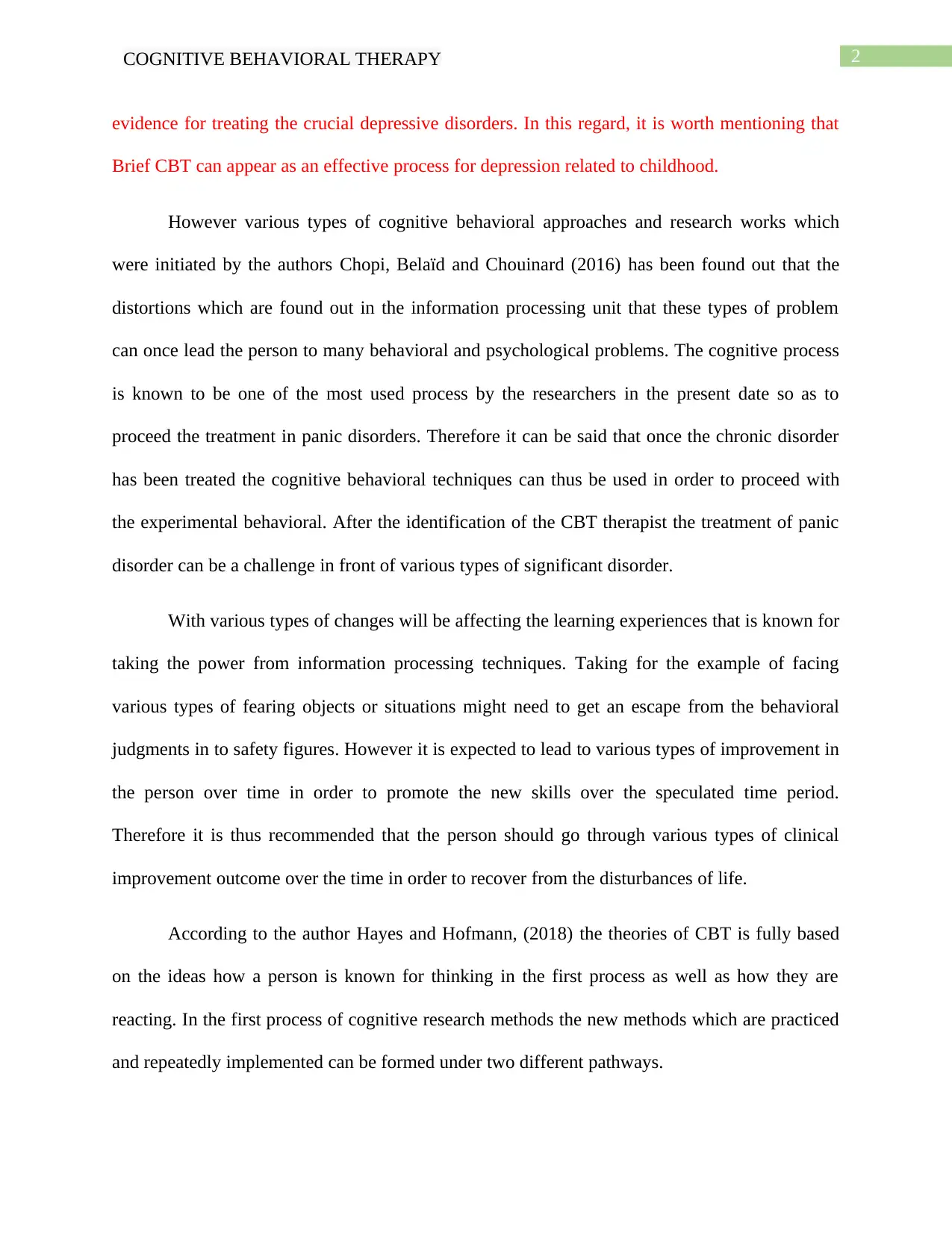
2COGNITIVE BEHAVIORAL THERAPY
evidence for treating the crucial depressive disorders. In this regard, it is worth mentioning that
Brief CBT can appear as an effective process for depression related to childhood.
However various types of cognitive behavioral approaches and research works which
were initiated by the authors Chopi, Belaïd and Chouinard (2016) has been found out that the
distortions which are found out in the information processing unit that these types of problem
can once lead the person to many behavioral and psychological problems. The cognitive process
is known to be one of the most used process by the researchers in the present date so as to
proceed the treatment in panic disorders. Therefore it can be said that once the chronic disorder
has been treated the cognitive behavioral techniques can thus be used in order to proceed with
the experimental behavioral. After the identification of the CBT therapist the treatment of panic
disorder can be a challenge in front of various types of significant disorder.
With various types of changes will be affecting the learning experiences that is known for
taking the power from information processing techniques. Taking for the example of facing
various types of fearing objects or situations might need to get an escape from the behavioral
judgments in to safety figures. However it is expected to lead to various types of improvement in
the person over time in order to promote the new skills over the speculated time period.
Therefore it is thus recommended that the person should go through various types of clinical
improvement outcome over the time in order to recover from the disturbances of life.
According to the author Hayes and Hofmann, (2018) the theories of CBT is fully based
on the ideas how a person is known for thinking in the first process as well as how they are
reacting. In the first process of cognitive research methods the new methods which are practiced
and repeatedly implemented can be formed under two different pathways.
evidence for treating the crucial depressive disorders. In this regard, it is worth mentioning that
Brief CBT can appear as an effective process for depression related to childhood.
However various types of cognitive behavioral approaches and research works which
were initiated by the authors Chopi, Belaïd and Chouinard (2016) has been found out that the
distortions which are found out in the information processing unit that these types of problem
can once lead the person to many behavioral and psychological problems. The cognitive process
is known to be one of the most used process by the researchers in the present date so as to
proceed the treatment in panic disorders. Therefore it can be said that once the chronic disorder
has been treated the cognitive behavioral techniques can thus be used in order to proceed with
the experimental behavioral. After the identification of the CBT therapist the treatment of panic
disorder can be a challenge in front of various types of significant disorder.
With various types of changes will be affecting the learning experiences that is known for
taking the power from information processing techniques. Taking for the example of facing
various types of fearing objects or situations might need to get an escape from the behavioral
judgments in to safety figures. However it is expected to lead to various types of improvement in
the person over time in order to promote the new skills over the speculated time period.
Therefore it is thus recommended that the person should go through various types of clinical
improvement outcome over the time in order to recover from the disturbances of life.
According to the author Hayes and Hofmann, (2018) the theories of CBT is fully based
on the ideas how a person is known for thinking in the first process as well as how they are
reacting. In the first process of cognitive research methods the new methods which are practiced
and repeatedly implemented can be formed under two different pathways.
⊘ This is a preview!⊘
Do you want full access?
Subscribe today to unlock all pages.

Trusted by 1+ million students worldwide
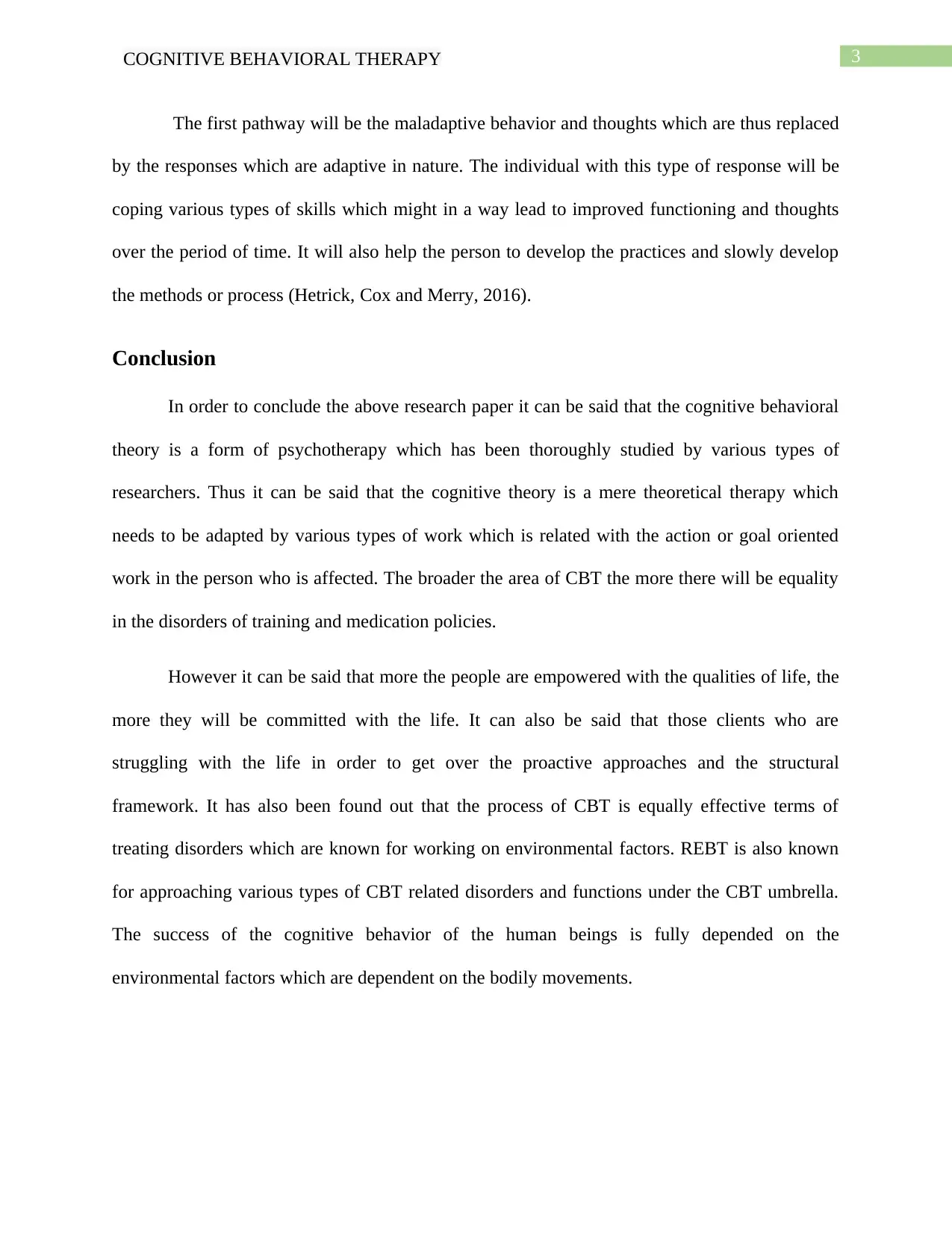
3COGNITIVE BEHAVIORAL THERAPY
The first pathway will be the maladaptive behavior and thoughts which are thus replaced
by the responses which are adaptive in nature. The individual with this type of response will be
coping various types of skills which might in a way lead to improved functioning and thoughts
over the period of time. It will also help the person to develop the practices and slowly develop
the methods or process (Hetrick, Cox and Merry, 2016).
Conclusion
In order to conclude the above research paper it can be said that the cognitive behavioral
theory is a form of psychotherapy which has been thoroughly studied by various types of
researchers. Thus it can be said that the cognitive theory is a mere theoretical therapy which
needs to be adapted by various types of work which is related with the action or goal oriented
work in the person who is affected. The broader the area of CBT the more there will be equality
in the disorders of training and medication policies.
However it can be said that more the people are empowered with the qualities of life, the
more they will be committed with the life. It can also be said that those clients who are
struggling with the life in order to get over the proactive approaches and the structural
framework. It has also been found out that the process of CBT is equally effective terms of
treating disorders which are known for working on environmental factors. REBT is also known
for approaching various types of CBT related disorders and functions under the CBT umbrella.
The success of the cognitive behavior of the human beings is fully depended on the
environmental factors which are dependent on the bodily movements.
The first pathway will be the maladaptive behavior and thoughts which are thus replaced
by the responses which are adaptive in nature. The individual with this type of response will be
coping various types of skills which might in a way lead to improved functioning and thoughts
over the period of time. It will also help the person to develop the practices and slowly develop
the methods or process (Hetrick, Cox and Merry, 2016).
Conclusion
In order to conclude the above research paper it can be said that the cognitive behavioral
theory is a form of psychotherapy which has been thoroughly studied by various types of
researchers. Thus it can be said that the cognitive theory is a mere theoretical therapy which
needs to be adapted by various types of work which is related with the action or goal oriented
work in the person who is affected. The broader the area of CBT the more there will be equality
in the disorders of training and medication policies.
However it can be said that more the people are empowered with the qualities of life, the
more they will be committed with the life. It can also be said that those clients who are
struggling with the life in order to get over the proactive approaches and the structural
framework. It has also been found out that the process of CBT is equally effective terms of
treating disorders which are known for working on environmental factors. REBT is also known
for approaching various types of CBT related disorders and functions under the CBT umbrella.
The success of the cognitive behavior of the human beings is fully depended on the
environmental factors which are dependent on the bodily movements.
Paraphrase This Document
Need a fresh take? Get an instant paraphrase of this document with our AI Paraphraser
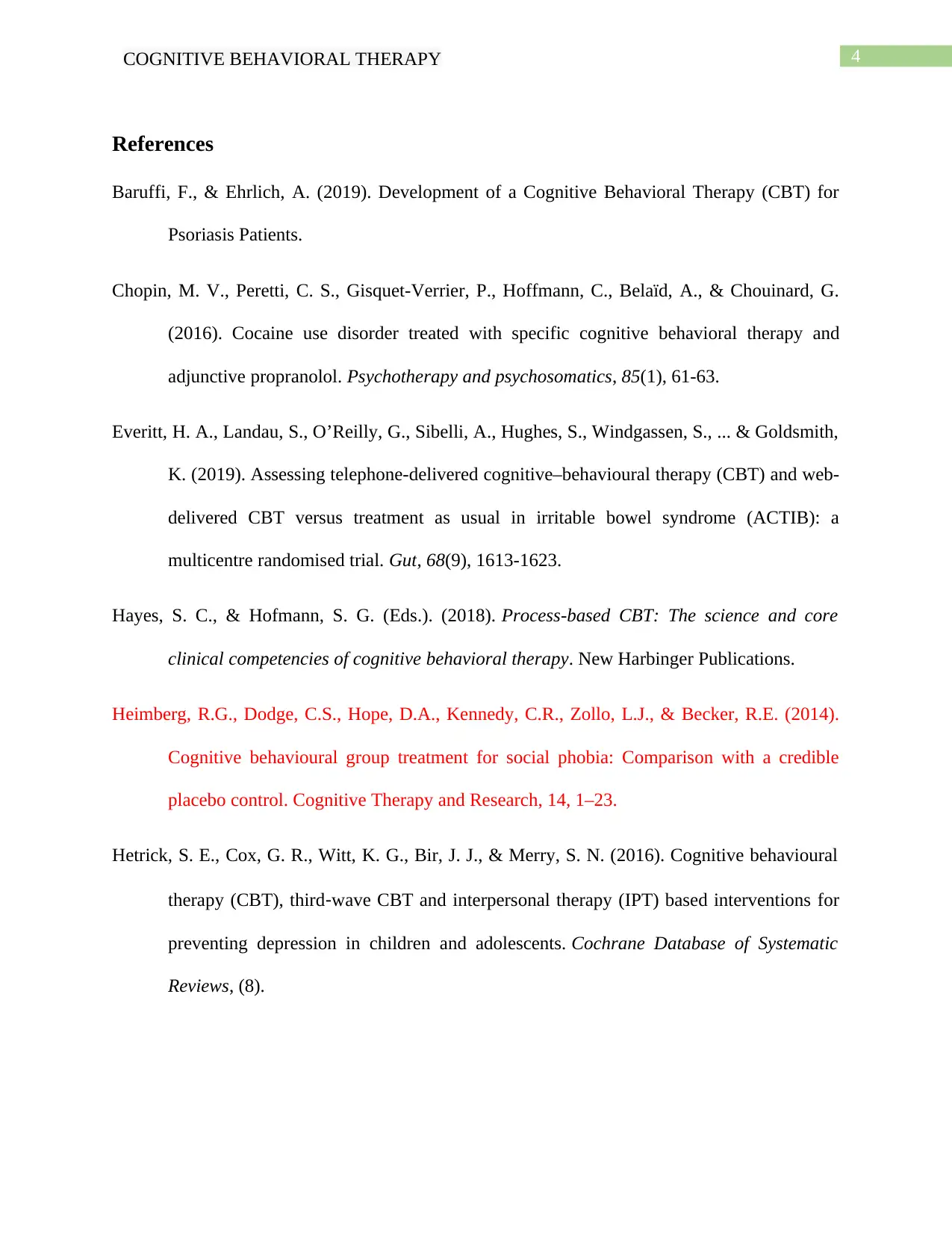
4COGNITIVE BEHAVIORAL THERAPY
References
Baruffi, F., & Ehrlich, A. (2019). Development of a Cognitive Behavioral Therapy (CBT) for
Psoriasis Patients.
Chopin, M. V., Peretti, C. S., Gisquet-Verrier, P., Hoffmann, C., Belaïd, A., & Chouinard, G.
(2016). Cocaine use disorder treated with specific cognitive behavioral therapy and
adjunctive propranolol. Psychotherapy and psychosomatics, 85(1), 61-63.
Everitt, H. A., Landau, S., O’Reilly, G., Sibelli, A., Hughes, S., Windgassen, S., ... & Goldsmith,
K. (2019). Assessing telephone-delivered cognitive–behavioural therapy (CBT) and web-
delivered CBT versus treatment as usual in irritable bowel syndrome (ACTIB): a
multicentre randomised trial. Gut, 68(9), 1613-1623.
Hayes, S. C., & Hofmann, S. G. (Eds.). (2018). Process-based CBT: The science and core
clinical competencies of cognitive behavioral therapy. New Harbinger Publications.
Heimberg, R.G., Dodge, C.S., Hope, D.A., Kennedy, C.R., Zollo, L.J., & Becker, R.E. (2014).
Cognitive behavioural group treatment for social phobia: Comparison with a credible
placebo control. Cognitive Therapy and Research, 14, 1–23.
Hetrick, S. E., Cox, G. R., Witt, K. G., Bir, J. J., & Merry, S. N. (2016). Cognitive behavioural
therapy (CBT), third‐wave CBT and interpersonal therapy (IPT) based interventions for
preventing depression in children and adolescents. Cochrane Database of Systematic
Reviews, (8).
References
Baruffi, F., & Ehrlich, A. (2019). Development of a Cognitive Behavioral Therapy (CBT) for
Psoriasis Patients.
Chopin, M. V., Peretti, C. S., Gisquet-Verrier, P., Hoffmann, C., Belaïd, A., & Chouinard, G.
(2016). Cocaine use disorder treated with specific cognitive behavioral therapy and
adjunctive propranolol. Psychotherapy and psychosomatics, 85(1), 61-63.
Everitt, H. A., Landau, S., O’Reilly, G., Sibelli, A., Hughes, S., Windgassen, S., ... & Goldsmith,
K. (2019). Assessing telephone-delivered cognitive–behavioural therapy (CBT) and web-
delivered CBT versus treatment as usual in irritable bowel syndrome (ACTIB): a
multicentre randomised trial. Gut, 68(9), 1613-1623.
Hayes, S. C., & Hofmann, S. G. (Eds.). (2018). Process-based CBT: The science and core
clinical competencies of cognitive behavioral therapy. New Harbinger Publications.
Heimberg, R.G., Dodge, C.S., Hope, D.A., Kennedy, C.R., Zollo, L.J., & Becker, R.E. (2014).
Cognitive behavioural group treatment for social phobia: Comparison with a credible
placebo control. Cognitive Therapy and Research, 14, 1–23.
Hetrick, S. E., Cox, G. R., Witt, K. G., Bir, J. J., & Merry, S. N. (2016). Cognitive behavioural
therapy (CBT), third‐wave CBT and interpersonal therapy (IPT) based interventions for
preventing depression in children and adolescents. Cochrane Database of Systematic
Reviews, (8).
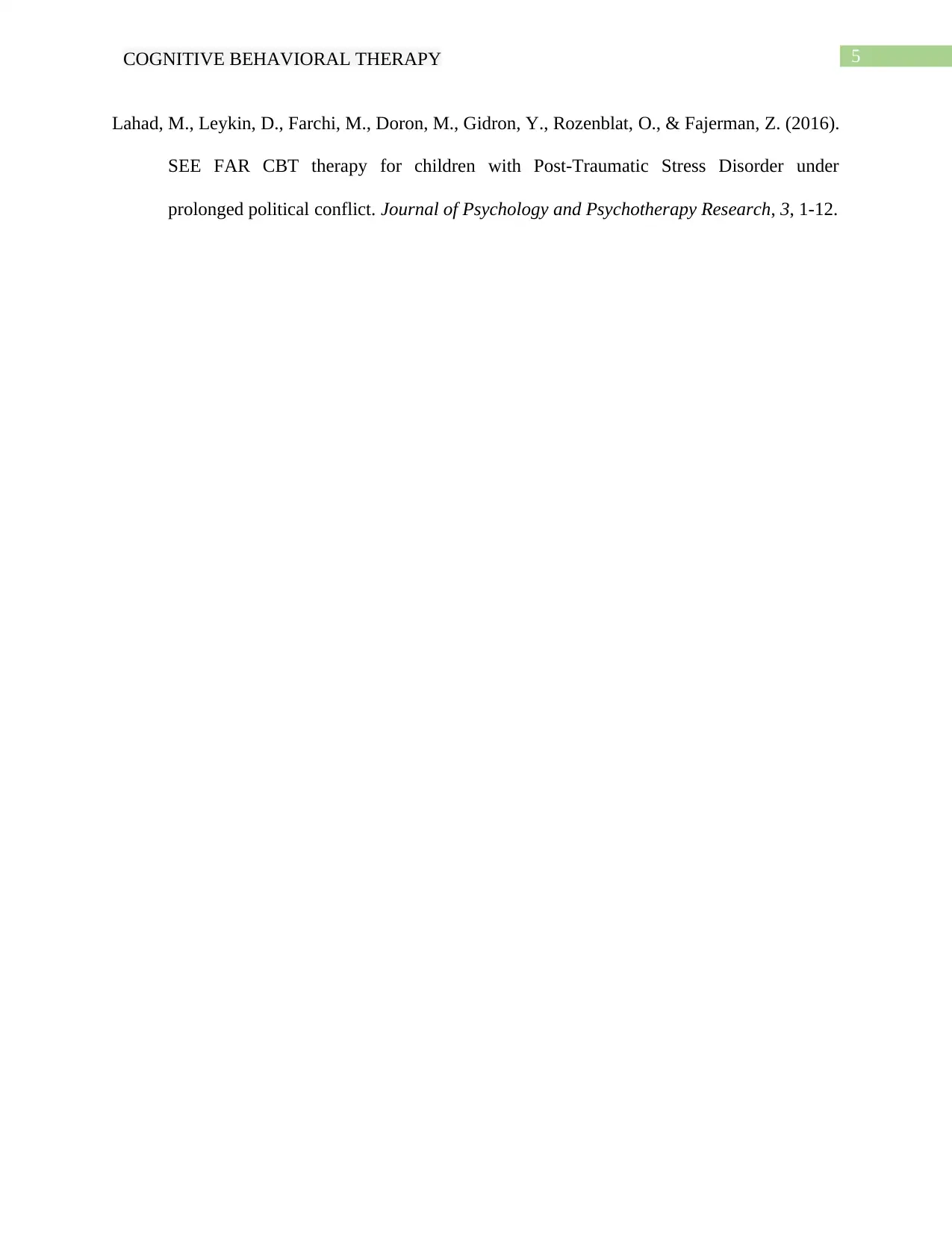
5COGNITIVE BEHAVIORAL THERAPY
Lahad, M., Leykin, D., Farchi, M., Doron, M., Gidron, Y., Rozenblat, O., & Fajerman, Z. (2016).
SEE FAR CBT therapy for children with Post-Traumatic Stress Disorder under
prolonged political conflict. Journal of Psychology and Psychotherapy Research, 3, 1-12.
Lahad, M., Leykin, D., Farchi, M., Doron, M., Gidron, Y., Rozenblat, O., & Fajerman, Z. (2016).
SEE FAR CBT therapy for children with Post-Traumatic Stress Disorder under
prolonged political conflict. Journal of Psychology and Psychotherapy Research, 3, 1-12.
⊘ This is a preview!⊘
Do you want full access?
Subscribe today to unlock all pages.

Trusted by 1+ million students worldwide
1 out of 6
Related Documents
Your All-in-One AI-Powered Toolkit for Academic Success.
+13062052269
info@desklib.com
Available 24*7 on WhatsApp / Email
![[object Object]](/_next/static/media/star-bottom.7253800d.svg)
Unlock your academic potential
Copyright © 2020–2025 A2Z Services. All Rights Reserved. Developed and managed by ZUCOL.





